Yamaha TTR 125 Dirt Bike Specs & Review
A wide range of exciting features makes the Yamaha TTR 125 an ideal beginner 4 stroke dirt bike.
The Yamaha TTR125 has been a popular choice for riders around the world. I’ve owned one, and so has my father, and my cousin. With all this first-hand experience riding the Yamaha TTR 125, I thought I would share a detailed review and guide you through the specs and changes that have taken place to improve this fan-favourite dirt bike.
Introduction
The Yamaha TTR 125 was first produced in 2000 as a direct competitor to the Honda XR 100 which was my first-ever dirt bike. Both of these bikes were designed as mid-sized stepping-stone dirt bike for beginner riders. Both manufacturers have continuously improved upon old models and released new models, the main rival of the TTR 125 is now the Honda CRF 125F.
The TTR 125 is a 4-stroke beginner dirt bike. The setup is tailored to be easier to ride than its YZ 125 motocross counterpart. It offers riders a lower seat height, softer suspension settings along with a lower-end performance engine. All these factors make the TTR 125 an ideal beginner 4-stroke dirt bike.
Yamaha TTR 125 Specs
Here’s a list of all the basic specs of the Yamaha TTR125:
- Top Speed: 45-50mph
- Seat Height: 30.5″ (125 small-wheel)/31.7″ (125L/LE large-wheel)
- Weight: 172 (dry)
- Price – $3,349 MSRP
- Engine: 124cc air-cooled 4-stroke
- Transmission: 5-speed
- Clutch: Wet clutch, Manual
- Fuel system: 20mm Mikuni carburetor
- Wheelbase: 50″
- Front-wheel: 17″ (125)/19″ (125L/LE)
- Rear wheel: 14″ (125)/16″ (125L/LE)
- Ground Clearance: 10.4″ (125)/11.6″ (125L/LE)
- Fuel Capacity: 1.74 gallons (6.58 litres)
Seat Height
When choosing which dirt bike to buy, pay careful attention to the seat height. Particularly when buying a bike for a new rider. A bike that sits too tall will be difficult to reach the ground with a safe flat foot when stopping or manoeuvring.
Buying a bike that’s too small will result in an uncomfortable ride. Although smaller bikes are easier to handle, they’re not set up for optimal riding pleasure or performance. If you’re looking at buying the bike for a youngster that is still expected to grow, it’s worth buying a bike that’s slightly too big, allowing the rider to grow in comfort as their size grows into the bike. The Yamaha TTR 125 has a seat height of 30.5 inches.
Engine Power
It’s a terrible idea for beginners to start on a dirt bike with too much horsepower. It’s hard to control and difficult to practice. A bike with too much power will scare a new rider from riding and possibly even scare a new rider away from dirt bikes completely. The Yamaha TTR 125 is a perfect bike to learn on. I know many riders that still ride the TTR 125. It’s amazing how much skill plays a role in speed vs actual engine performance. Give a pro a TTR 125 and he’ll probably still beat me on KTM 300.
The Yamaha TTR 125 is a single-cylinder, four-stroke enduro dirt bike with maximum torque of 6.64 ft/lbs (9.0 Nm) @ 6500 RPM. Yamaha claims the max horsepower is 9.39 HP (7.0 KW) @ 9800 RPM.
Handling
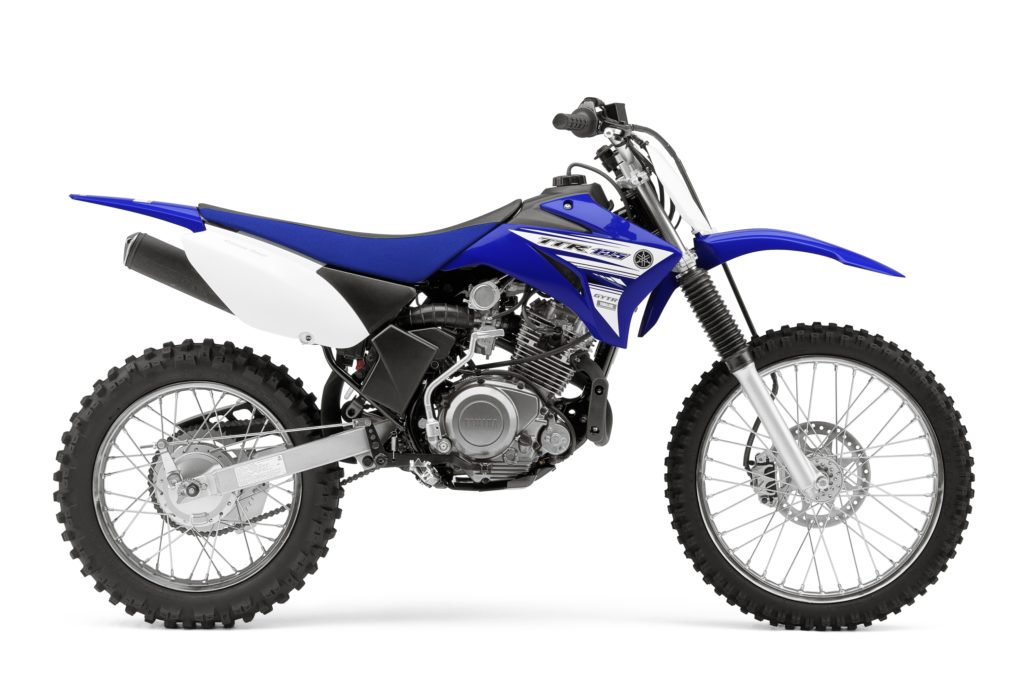
While the TTR 125 may not be the best in its class at handling, speed, or performance, it certainly doesn’t leave anything on the table. As a new rider, the TTR 125 is a great option. It offers a low down center of gravity which helps in the tight twisty corners. To add to the agility, the wheelbase is short which helps to create a tight turning circle.
You can make some big handling improvements by fine-tuning your suspension over the stock setup. You might also consider making some small changes to get the bike feeling just right for the rider. For example, the handlebars could be rotated forward or back depending on the rider’s height, or completely swapped for a better set of bars. You could also change the position of the clutch and front brake making it feel more comfortable for the rider.
Top Speed
So how fast does a TTR 125 go? A Yamaha TTR 125 has a top speed of around 50 mph. This can me altered slightly by adjusting the gearing of the bike which can make it go faster or slower. The top speed of 50mph is assuming the bike has the stock gearing setup.
Suspension
As with most beginner dirt bikes, the TTR 125 is lacking in the suspension department. Although, if you’re a beginner rider, you’re not going to be able to notice the difference between entry-level and pro-level suspension. The same can be said for ultra-lightweight riders.
New riders that are not too aggressive on the bike will find that the softer spring rate and valving works perfectly fine on the TTR 125 and 125LE. Although more serious riders should consider upgrading the forks and shocks.
Brakes
One of the key differences between the TTR 125 and 125LE models is the brakes. The TTR 125 has old-school drum brakes on both the front and rear. The drum brakes are more than enough stopping power for beginner riders. Make sure to check the brakes are not worn, have not been sprayed with any kind of lubricant, and that has been set up correctly. The 125LE models come standard with front disc brakes. Disc brakes offer a substantial advantage over drum brakes. The same logic applies – make sure the setup is correct and that the brakes have no oil, dirt, or lubricant on them.
Jetting
Ensuring that the jetting has been fine-tuned will make a massive difference to the performance of the Yamaha TTR125. The stock carburetor is not the strongest selling point of the TTR125. You will need to do some fine-tuning to make sure the bike is not running too rich or too lean.
Gear Transmission
What makes this bike so good for beginner riders is the extremely short first gear. For advanced riders, first gear is almost useless on this bike. But, for beginners, having a very short gear helps with practicing gear changes which is arguably one of the most important foundational skills to learn on a dirt bike. A short first gear also means that you don’t need to allow the clutch to ride too far before getting the bike rolling.
After enough practice with the short first gear, you could swap out the small front sprocket for a slightly larger one which will help to extend the range of the first couple of gears.
Yamaha TTR 125 Model Differences
Yamaha TTR 125
This is the baseline model.
Yamaha TTR 125E
Baseline model + electric start
Yamaha TTR 125L
Larger than baseline + improved brakes
Yamaha TTR 125LE
Larger than baseline + improved brakes + electric start
Read more on the Yamaha website
Yamaha TTR 125 Spec Comparisons
Yamaha TTR 125 Vs Honda CRF 125f
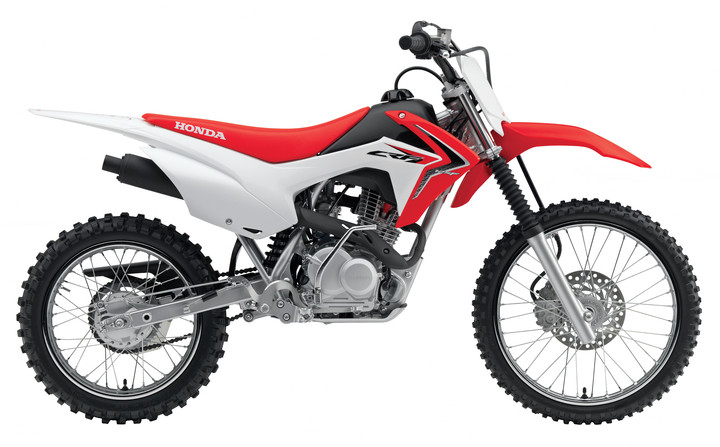
| Spec | Yamaha TTR125 Specs | Honda CRF125F Specs |
|---|---|---|
| Displacement | 124cc | 124.9cc |
| Bore and Stroke | 54.0mm x 54.0mm | 52.4mm x 57.9mm |
| Compression Ratio | 10.0:1 | 9.0:1 |
| Spark Plug | NGK CR7HSA | NGK CPR6EA-9 |
| Valve Clearance | IN: .003″ EX: .004″ | IN: 0.004″ / EX: 0.006″ |
| Carb/main jet/pilot jet | 20mm Mikuni / 100 main / 15 pilot | Keihin PD20 (PDB4BA) / 112 main / 38 pilot |
| Transmission ratios | 2.643 / 1.778 / 1.316 / 1.045 / 0.875 | 3.181 / 1.705 / 1.238 / 0.916 |
| Oil Capacity/Type | 1.27 US Quart / 20W-40 (40° F and above) | 1.0 US quart (refill)/ 1.1 quart (rebuild) / SAE 10W-40 |
| Chain size/front sprocket/rear sprocket | #428; 13T/49T / 13T/54T (L model) | 428 / 13T/46T / 13T/49T (FB-Model) |
| Front tire size | 70/100-17 / 70/100-19 (L model) | 70/100-17 / 70/100-19 (FB model) |
| Rear tire size | 90/100-14 / 90/100-16 (L model) | 90/100-14 / 90/100-16 (FB model) |
| Seat height | 30.5 inches | 28.9 inches / 30.9 inches (FB model) |
| Wheel Base | 50 inches | 48.0 inches / 49.4 inches (FB model) |
| Weight | 198 lbs | 192 lbs. / 194 lbs. (FB model) |
Yamaha TTR 125 Vs Kawasaki KLX140
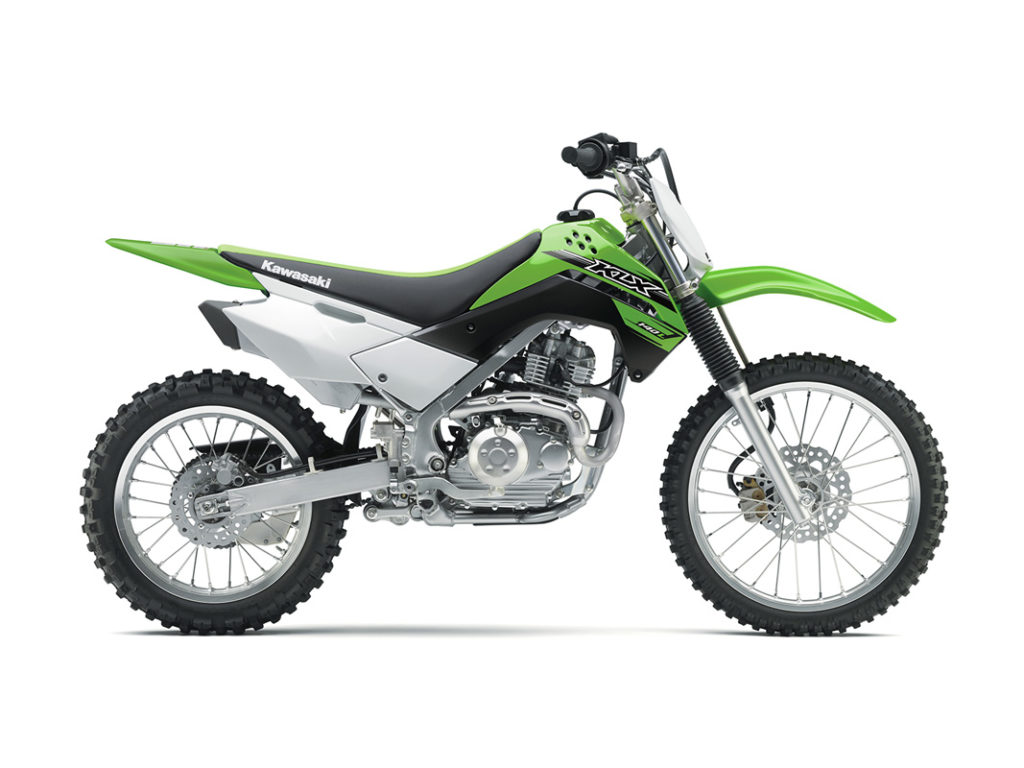
| Spec | Yamaha TTR125 Specs | Kawasaki KLX140 Specs |
|---|---|---|
| Displacement | 124cc | 124cc |
| Bore and Stroke | 54.0mm x 54.0mm | 57.0mm x 48.8mm |
| Compression Ratio | 10.0:1 | 9.5:1 |
| Spark Plug | NGK CR7HSA | NGK DR8EA |
| Valve Clearance | IN: .003″ EX: .004″ | IN: .003″ EX: .005″ |
| Carb/main jet/pilot jet | 20mm Mikuni / 100 main / 15 pilot | 20mm Mikuni / 102.5 main / 17.5 pilot |
| Transmission ratios | 2.643 / 1.778 / 1.316 / 1.045 / 0.875 | 3.00 / 1.857 / 1.368 / 1.095 / 0.923 |
| Oil Capacity/Type | 1.27 US Quart / 20W-40 (40° F and above) | 1.0 US Quart / 10W-40 |
| Chain size/front sprocket/rear sprocket | #428; 13T/49T / 13T/54T (L model) | #428; 14T/51 / 14T/57T (L model) |
| Front tire size | 70/100-17 / 70/100-19 (L model) | 70/100-17 / 70/100-19 (L model) |
| Rear tire size | 90/100-14 / 90/100-16 (L model) | 90/100-14 / 90/100-16 (L model) |
| Seat height | 30.5 inches | 30.5 inches / 31.7 inches (L model) |
| Wheel Base | 50 inches | 49 inches / 50 inches (L model) |
| Weight | 198 lbs | 194 lbs. / 196 lbs. (L model) |
Yamaha TTR 125 Vs Honda CRF150F
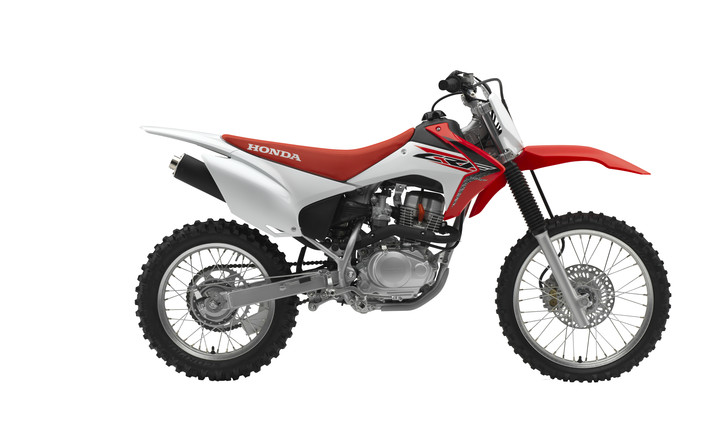
| Spec | Yamaha TTR125 Specs | Honda CRF150F Specs |
|---|---|---|
| Displacement | 124cc | 149cc |
| Bore and Stroke | 54.0mm x 54.0mm | 57.3mm x 57.8mm |
| Compression Ratio | 10.0:1 | 9.5:1 |
| Spark Plug | NGK CR7HSA | NGK CPR8EA-9 |
| Valve Clearance | IN: .003″ EX: .004″ | IN: .003″ EX: .005″ |
| Carb/main jet/pilot jet | 20mm Mikuni / 100 main / 15 pilot | 24mm Keihin / 90 main / 40 pilot |
| Transmission ratios | 2.643 / 1.778 / 1.316 / 1.045 / 0.875 | 2.786 / 1.875 / 1.409 / 1.120 / 0.938 |
| Oil Capacity/Type | 1.27 US Quart / 20W-40 (40° F and above) | 1.3 US Quart / 10W-30 |
| Chain size/front sprocket/rear sprocket | #428; 13T/49T / 13T/54T (L model) | #520 O-ring-sealed chain; 13T/48T |
| Front tire size | 70/100-17 / 70/100-19 (L model) | 70/100-19 |
| Rear tire size | 90/100-14 / 90/100-16 (L model) | 90/100-16 |
| Seat height | 30.5 inches | 32.5 inches |
| Wheel Base | 50 inches | 52.3 inches |
| Weight | 198 lbs | 236 lbs. |
Yamaha TTR 125 Vs CRF100F (XR100)
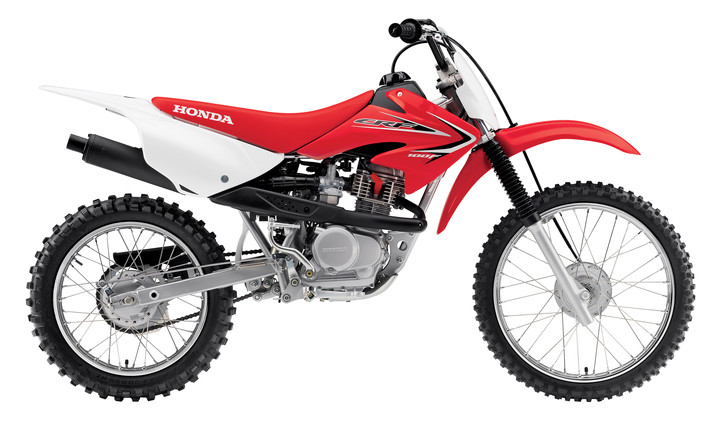
| Spec | Yamaha TTR125 Specs | Honda CRF100F (XR100) Specs |
|---|---|---|
| Displacement | 124cc | 99.00cc |
| Bore and Stroke | 54.0mm x 54.0mm | 53.0 x 45.0 mm |
| Compression Ratio | 10.0:1 | 9.4:1 |
| Spark Plug | NGK CR7HSA | NGK CR6HSA |
| Valve Clearance | IN: .003″ EX: .004″ | IN: .002″ EX: .002″ |
| Carb/main jet/pilot jet | 20mm Mikuni / 100 main / 15 pilot | 22mm Keihin / 92 main / 35 pilot |
| Transmission ratios | 2.643 / 1.778 / 1.316 / 1.045 / 0.875 | 3.083 / 1.882 / 1.400 / 1.130 / 0.923 |
| Oil Capacity/Type | 1.27 US Quart / 20W-40 (40° F and above) | 1.06 US quarts/10W-40 |
| Chain size/front sprocket/rear sprocket | #428; 13T/49T / 13T/54T (L model) | #428 chain; 14T/50T |
| Front tire size | 70/100-17 / 70/100-19 (L model) | 2.50-19 |
| Rear tire size | 90/100-14 / 90/100-16 (L model) | 3.00-16 |
| Seat height | 30.5 inches | 30.9 inches |
| Wheel Base | 50 inches | 49.4 inches |
| Weight | 198 lbs | 174 lbs. |
Yamaha TTR 125 Vs Kawasaki KLX 110 (Suzuki DRZ 110)
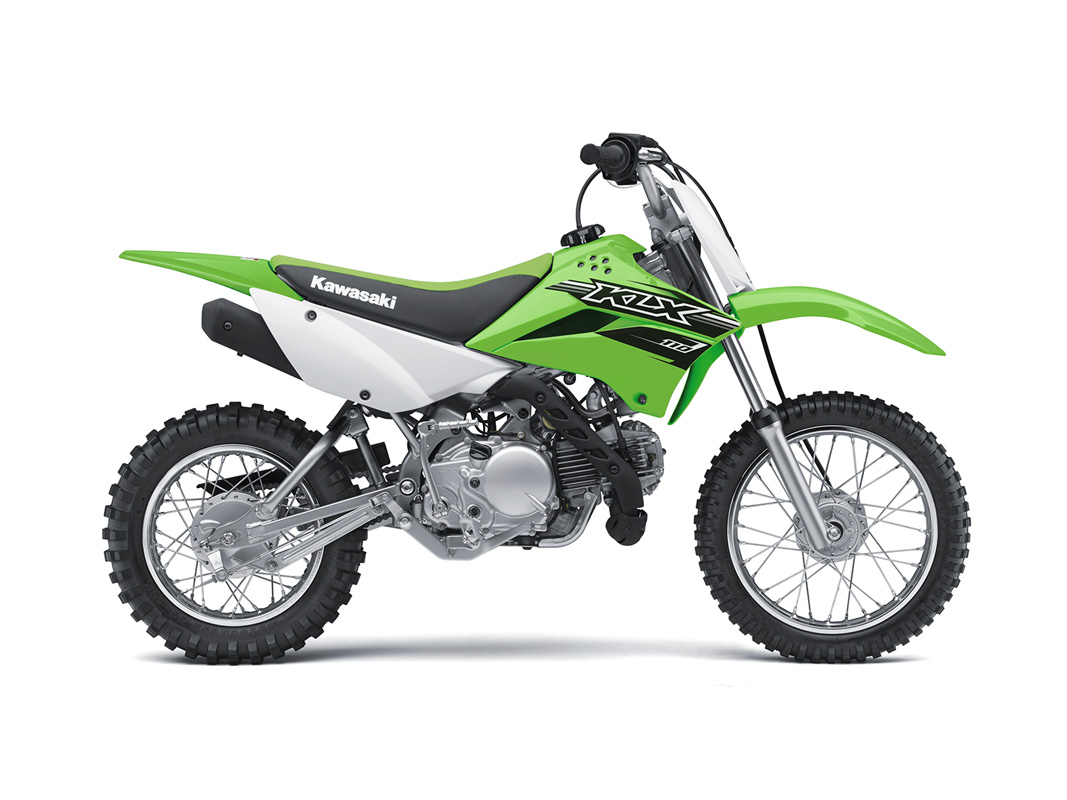
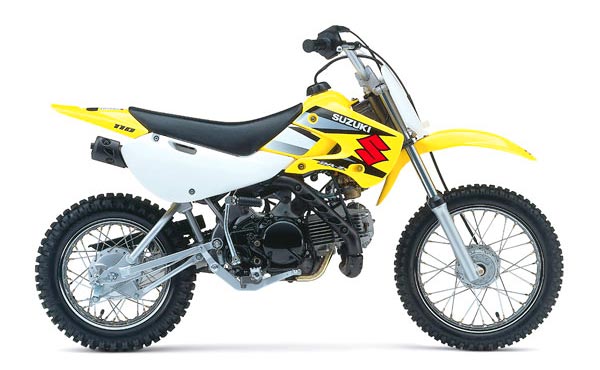
| Spec | Yamaha TTR125 Specs | Kawasaki KLX110 (Suzuki DRZ110) Specs |
|---|---|---|
| Displacement | 124cc | 112cc |
| Bore and Stroke | 54.0mm x 54.0mm | 53.0 x 50.6mm |
| Compression Ratio | 10.0:1 | 9.5:1 |
| Spark Plug | NGK CR7HSA | NGK CR6HSA |
| Valve Clearance | IN: .003″ EX: .004″ | IN: .002″ EX: .003″ |
| Carb/main jet/pilot jet | 20mm Mikuni / 100 main / 15 pilot | 18mm Mikuni / 80 main / 38 pilot |
| Transmission ratios | 2.643 / 1.778 / 1.316 / 1.045 / 0.875 | 3.273 / 1.938 / 1.350 |
| Oil Capacity/Type | 1.27 US Quart / 20W-40 (40° F and above) | 1.12 US Quarts / 10W-40 |
| Chain size/front sprocket/rear sprocket | #428; 13T/49T / 13T/54T (L model) | #420 / 14T / 37T |
| Front tire size | 70/100-17 / 70/100-19 (L model) | 2.50-14 |
| Rear tire size | 90/100-14 / 90/100-16 (L model) | 3.00-12 |
| Seat height | 30.5 inches | 26.8 inches / 28.7 (L model) |
| Wheel Base | 50 inches | 42.3 inches |
| Weight | 198 lbs | 168 lbs. |
Yamaha TTR 125 Vs Kawasaki KLX 125 (Suzuki DRZ 125)
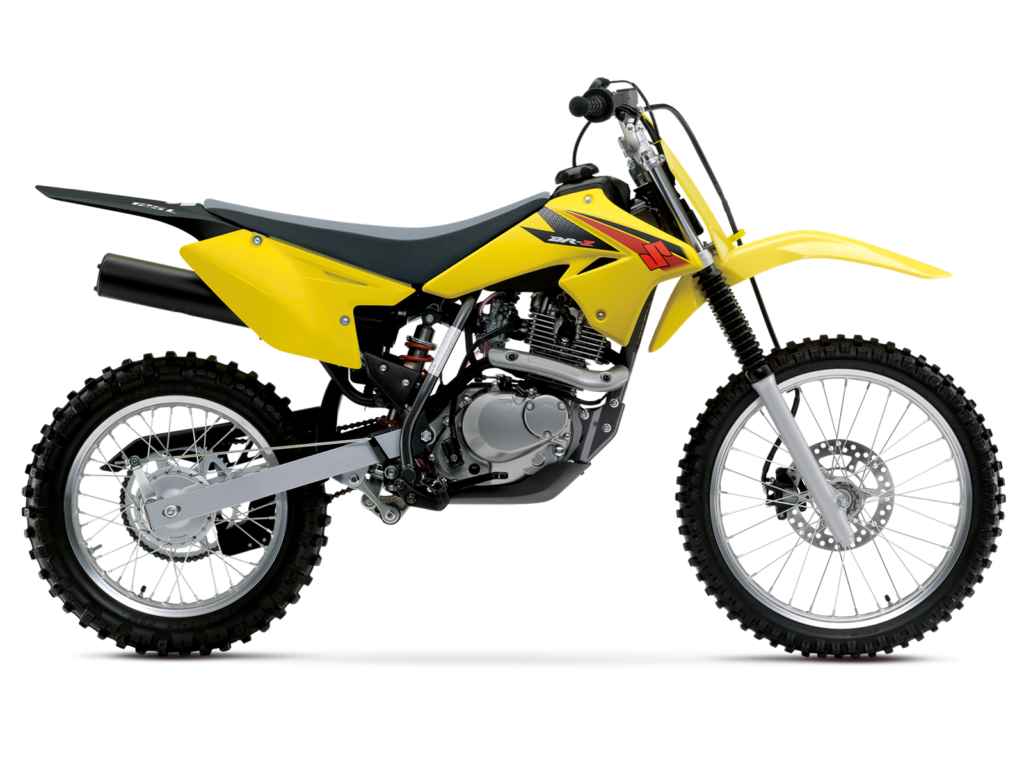
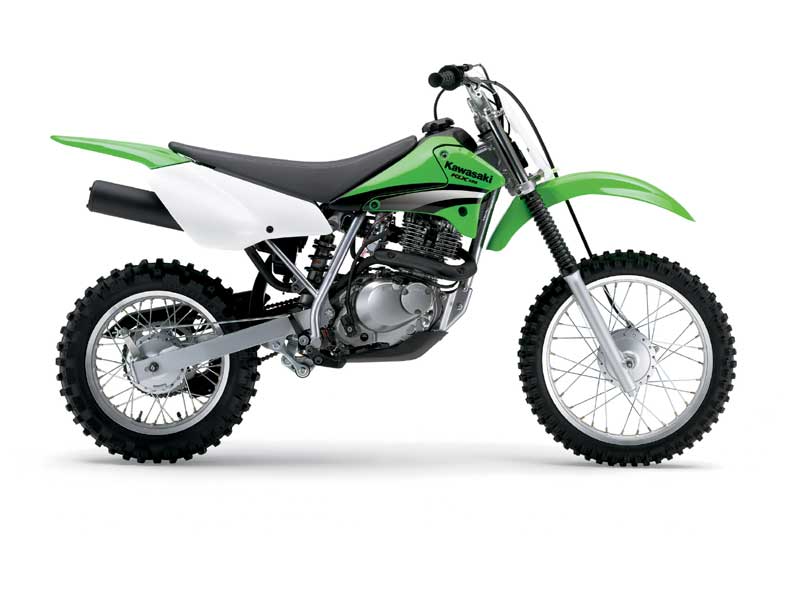
| Spec | Yamaha TTR125 Specs | Kawasaki KLX125 (Suzuki DRZ125) Specs |
|---|---|---|
| Displacement | 124cc | 124cc |
| Bore and Stroke | 54.0mm x 54.0mm | 57.0mm x 48.8mm |
| Compression Ratio | 10.0:1 | 9.5:1 |
| Spark Plug | NGK CR7HSA | NGK DR8EA |
| Valve Clearance | IN: .003″ EX: .004″ | IN: .003″ EX: .005″ |
| Carb/main jet/pilot jet | 20mm Mikuni / 100 main / 15 pilot | 20mm Mikuni / 102.5 main / 17.5 pilot |
| Transmission ratios | 2.643 / 1.778 / 1.316 / 1.045 / 0.875 | 3.00 / 1.857 / 1.368 / 1.095 / 0.923 |
| Oil Capacity/Type | 1.27 US Quart / 20W-40 (40° F and above) | 1.0 US Quart / 10W-40 |
| Chain size/front sprocket/rear sprocket | #428; 13T/49T / 13T/54T (L model) | #428; 14T/51 / 14T/57T (L model) |
| Front tire size | 70/100-17 / 70/100-19 (L model) | 70/100-17 / 70/100-19 (L model) |
| Rear tire size | 90/100-14 / 90/100-16 (L model) | 90/100-14 / 90/100-16 (L model) |
| Seat height | 30.5 inches | 30.5 inches / 31.7 inches (L model) |
| Wheel Base | 50 inches | 49 inches / 50 inches (L model) |
| Weight | 198 lbs | 194 lbs. / 196 lbs. (L model) |
